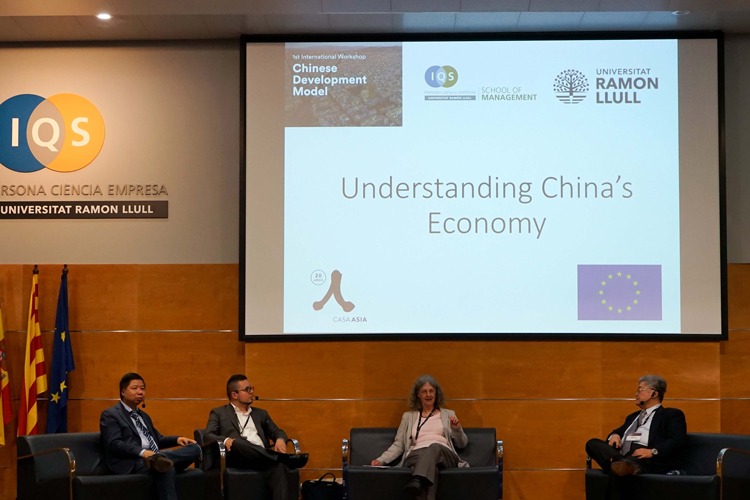In collaboration with Casa Asia, the IQS School of Management organized a roundtable to analyse the challenges facing the Chinese economy and how China is seeking to shake off the industrial power label and lead services and the tertiary sector.

In collaboration with Casa Asia, the IQS School of Management organized a roundtable to analyse the challenges facing the Chinese economy and how China is seeking to shake off the industrial power label and lead services and the tertiary sector.
Sponsored by IQS, the debate took place within the framework of the 1st Workshop on the Chinese Development Model, with the intention of organizing future editions as well and becoming an international benchmark on the subject. The workshop featured four plenary sessions, starred three Keynote Speakers, and offered 22 presentations on various topics related to the Chinese economy. The event was truly global in scale, with 85% of the participants having international profiles. Attendees included the Consul General of China in Barcelona, the Vice-Consul of China, the Casa Asia Director of Economic Programmes, the Casa Asia Coordinator of Economic Programmes and Cooperation, and the President of the China Economic Association in Europe and the United Kingdom.
Jack W. Hou, professor of Economics at the University of California and one of the academics participating in the roundtable, reflected on the Chinese education system and stated his belief that young people educated in China tend to lack the creative capacity necessary to create innovative business projects.
“Education in China is very different. Innovation isn't taught to children from an early age, but productivity is. We need different things. There are big companies like Alibaba or TikTok that haven't really invented anything, but have improved other formats. When we're young we're taught to obey our parents and later on our teachers. We have to change that. We must think for ourselves to become imaginative and creative work against what's already established to create new things,” said Professor Hou.
Extreme competitiveness among students
Professor Barbara Fraumeni, with the Central University of Finance and Economics in China, and Tony Fang, Professor with Memorial University in Newfoundland, also spoke at the roundtable. Professor Fraumeni sought to highlight how competitive education is in China and how difficult it is to stand out among millions of other people reaching for the same goal: “The level of education is really high. I think it's essential for students to focus on their studies. Many of them have to work and it's impossible for them to balance everything considering the intense competition to get the best jobs in the future,” she claimed.
Professor Hou pointed out a basic problem in the education system, that many students lack access to vocational education, which must be reversed in his opinion: “China does not invest in vocational studies, in technical colleges, or in technological vocational education. It's a cultural problem. We're very traditional and are not committed to vocational education. "Vocational college" doesn't exist in China, a school where you can specialize and choose what you want to do. Everything is too fast,” he said. Along these lines, Professor Tony Fang believes that it's essential for young Chinese people go to other countries to learn new methods that can't be found in China: “The government has chosen to educate its students in other countries. Because of this, many graduates do not return to China and end up working in Silicon Valley or at prestigious universities around the world. Now local companies are starting to attract talent from other countries, but the initial idea was for Chinese students to improve abroad and return home. That's why education is an investment,” he stated.
China, a digital powerhouse under construction
Professor Fang highlighted that about 900 million people use the Internet in China, thus the importance of the web as a business catalyst and in wealth generation cannot be ignored.
Professors Hou and Fang spoke referred to Alibaba as an example of a Chinese company that has been able to adapt to new times by incorporating technology to become one of the planet's most important entities in the online shopping market. Despite this, Professor Hou stressed that Alibaba is one of the clearest examples that Chinese companies need to be innovative. He believes that Alibaba's creators haven't invented anything new, but simply adapted a business model that had already worked in the West.
Tony Fang, disagreed with this statement to an extent, highlighting that there are large companies and highly trained professionals in China who are ready to take the next leap forward that the Chinese economy must have. He also mentioned the Chinese community abroad: “They are successful people who are able to collaborate with one another to make their businesses work well around the world,” Fang said.










